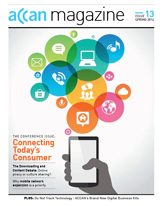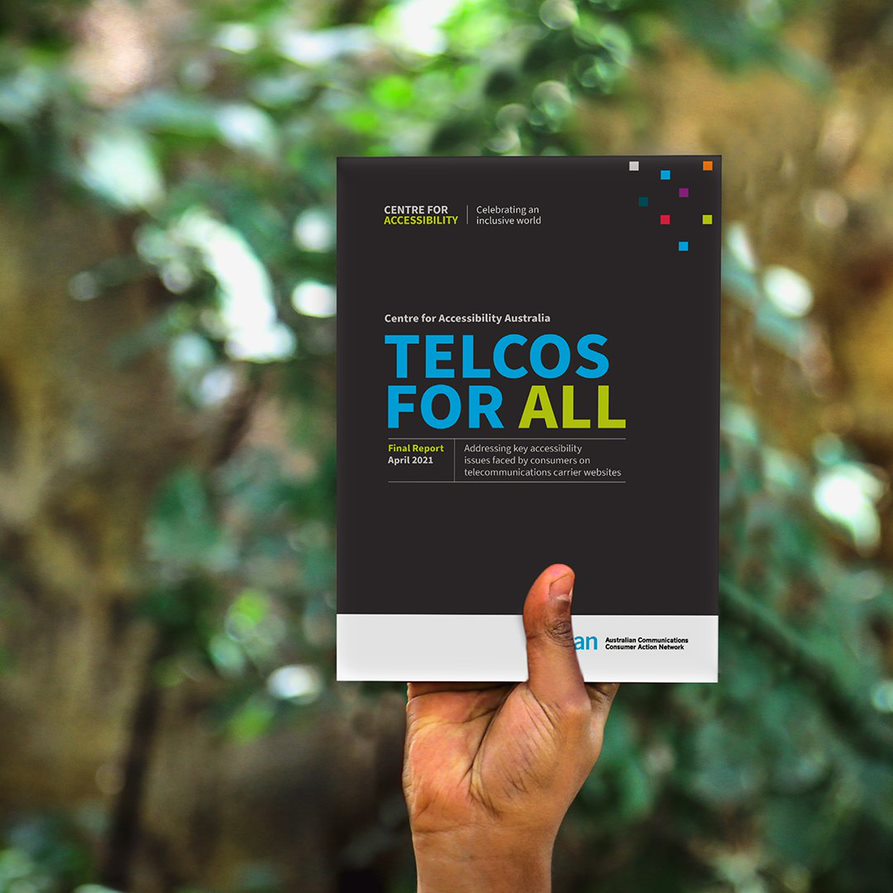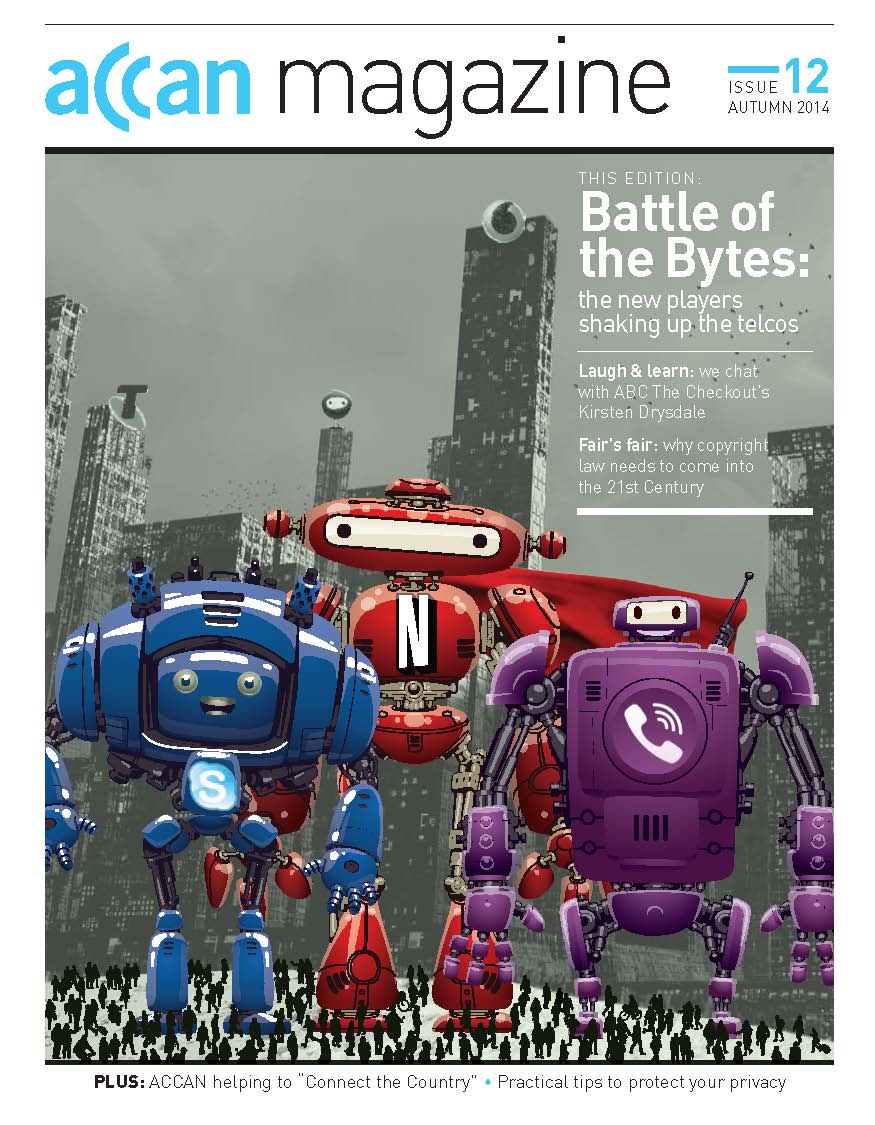Key Dates
Next Grant Round:
Applications for funding will open early 2025.
> Information about our Grants Program
Independent Grants Panel:
Results of the recent EOI will be notified Dec 2024.
> Information about our Panel
We can help: grants@accan.org.au
or phone 02 9288 4000
Subscribe to Grants Program mailings
Wamboin Communications Action Group Inc.
This project assisted regional and rural areas to effectively engage with their local communities and build a business case for the implementation of network capabilities to support their current and future needs. The project delivered a set of resources that can be applied across regional, rural and remote areas to help communities identify local requirements to achieve better Internet connectivity to support their economic and social growth.
Read more: Achieve Better Broadband for Regional Communities
![]()
Tablet devices - Tasmania
The resource provides a series of guidelines on how to make Word and PDF documents accessible and outlines a checklist to create accessible publications and presentations. It also lists the accessibility features of different online meeting platforms such as Zoom, Microsoft Teams and Google Meet, and identifies key physical, visual and audio requirements for accessible physical meeting spaces.
Read more: Accessibility Best Practice Guide
Write comment (0 Comments)ACCAN has today welcomed the Albanese Government’s introduction of legislation to the parliament to keep the National Broadband Network in public ownership.
ACCAN supports NBN Co in its mission to deliver affordable, accessible, high-speed broadband to all Australians. This legislation ensures that the public interest will remains front and centre.
Australian taxpayers have outlaid nearly $60 billion for the construction of the NBN in the 15 years since it was established.
ACCAN recently submitted to the Australian Treasury’s Pre-Budget consultation to provide our views on priorities for the 2025-2026 Budget. Our submission calls on the Australian Government to address the barriers faced by communications consumers in accessing affordable, reliable, competitive and accessible telecommunications services.
Over the last year the communications landscape has changed dramatically. Consumers have never had more choice yet many consumers are confused about the products and services on offer, and service complaint numbers continue to rise.
In this conference we talk about how the market does, and does not, deliver for consumers. Is customer service improving? Will emerging technology provide better options for consumers in the future? What is the communications industry doing to focus on the vital service part of their businesses and how can it be done better?
Read more: ACCAN National Conference 2012: Delivering for Consumers
Download: ![]() My home broadband is slow or unreliable57 KB
My home broadband is slow or unreliable57 KB
Download: ![]() My home broadband is slow or unreliable301.81 KB
My home broadband is slow or unreliable301.81 KB
Many factors can affect the quality of your broadband connection. This can include the quality of the wiring to your home or your equipment inside the home. Read ACCAN’s tip sheet for more information on this.
If you cannot use the internet in the way you need to due to poor speeds or connection problems, you should:
- Do an online speed test to compare your home internet speed to your retail service provider’s (RSP) advertised speeds. Keep records of the speeds you get and how many drop outs occur if your service is unreliable.
- Contact your RSP and clearly state that you want to make a complaint about slow speeds or an unreliable service.
Read more: My home broadband is slow or unreliable
Write comment (0 Comments)
ACCAN, along with a number of Australian disability organisations, recommend that all governments, businesses and organisations immediately remove all inaccessible CAPTCHAs from their websites and replace them with accessible alternatives.

Download: ![]() Connecting Todays Consumer.pdf1.46 MB
Connecting Todays Consumer.pdf1.46 MB
Download accessible version: ![]() Connecting Todays Consumer.doc105.5 KB
Connecting Todays Consumer.doc105.5 KB
 ACCAN and Infoxchange have come together to produce a report focusing on the more than 427,000 dwellings (about 5 per cent of housing stock) in Australia which fall into the category of social housing – housing provided by the government and community sectors to accommodate people in the lowest income brackets. Residents of social housing are more likely to fall on the wrong side of the digital divide, and face a range of barriers in getting connected. These barriers can be practical, such as getting permissions to install connections in old apartment blocks, budgetary, where the cost to sign up may be prohibitive, or may be related to digital literacy.
ACCAN and Infoxchange have come together to produce a report focusing on the more than 427,000 dwellings (about 5 per cent of housing stock) in Australia which fall into the category of social housing – housing provided by the government and community sectors to accommodate people in the lowest income brackets. Residents of social housing are more likely to fall on the wrong side of the digital divide, and face a range of barriers in getting connected. These barriers can be practical, such as getting permissions to install connections in old apartment blocks, budgetary, where the cost to sign up may be prohibitive, or may be related to digital literacy.
The summary below outlines ACCAN's activities from 1 June – 31 August 2018.
 Centre for Accessibility
Centre for Accessibility
In 2021, the Centre For Accessibility (CFA) Australia undertook research to improve the accessibility of websites and apps provided by the telecommunications sector.
![]()
Tablet devices - Western Australia
Notice is hereby given that the Annual General Meeting of the ACCAN will be held at the ACCAN office, WeWork, 320 Pitt Street, Sydney or via Zoom, on Thursday 12th October 2023 from 4.00pm.
ACCAN AGM
Date: Thursday 12 October 2023
Time: 4.00pm (AEDT)
Venue: Hybrid Meeting via Zoom or at the ACCAN office, WeWork, 320 Pitt Street, Sydney – Please register from here by 10 October 2023
Read more: Notice of ACCAN Annual General Meeting (Hybrid Meeting)
Write comment (0 Comments)Today’s announcement from Minister Rowland that Australians facing domestic and family violence (DFV) will receive new, stronger protections for their essential communications services is a significant and welcome development.
This decision follows years of advocacy from ACCAN and others in the community sector, urging more robust protections about the use of telecommunications services by DFV victims, and the misuse of technology by DFV perpetrators. Through media releases, policy submissions and consultation, we have called for protections that ensure telcos act responsibly when dealing with vulnerable customers.
Read more: ACCAN welcomes new telco rules to curb DFV scourge
ACCAN recently submitted to the Australian Competition and Consumer Commission (ACCC) on the Regional Broadband Scheme (RBS) Levy. The RBS is critical to the funding of non-commercial regional, rural and remote NBN services. ACCAN supports the positions of the ACCC, which will strengthen confidence and trust in the RBS by ensuring that the levy reflects the efficient costs of delivering non-commercial services.
Read more: Regional Broadband Scheme (RBS) Levy submission 2024
Wondering how to make Facebook work with your screenreader, or whether LinkedIn is accessible? These tip sheets from Media Access Australia, available in print or audio formats, are full of tips and tricks for getting around the accessibility challenges of popular social media platforms. See below to access easy-to-understand information about how to use Facebook, LinkedIn, Twitter, Skype and YouTube, or to learn more about blogging.
Read more: Sociability: social media for people with a disability
Write comment (1 Comment) Download:
Download: ![]() Received an unexpectedly high bill47.89 KB
Received an unexpectedly high bill47.89 KB
Download: ![]() Received an unexpectedly high bill158.06 KB
Received an unexpectedly high bill158.06 KB
Many phone providers have a limit on how many calls you can make, texts you can send and data you can use each month. If you go over your limit you could be charged extra fees. These fees can be very expensive and it is best to avoid going over your limit if you can.
Read more: Received an unexpectedly high bill?
Write comment (0 Comments)ACCAN would like to invite our members, financial counsellors and others to attend a "Your Rights" workshop being hosted by ACCAN Chief Executive, Teresa Corbin. Ms Corbin will explain what rights Australian phone and internet customers in relation to common issues such as bill shock, mobile phone and internet contracts and how to make an effective complaint.
ACCAN and CHOICE's joint position statement on mobile commerce outlines the key consumer protection principles for m-commerce in the Australian market.
In May 2015, ACCAN commissioned Galaxy Research to complete a survey of consumers regarding telco and ISP complaints. The survey found that 46 per cent of telco consumers reported having a problem with their phone or internet provider in the last year, representing more than 8.5 million Australians.
According to the survey, around one third of respondents (38 per cent) who had a problem with their phone or internet service, complained to their provider and were dissatisfied with the response from the telco. However, only nine per cent of these consumers escalated their complaint to the TIO suggesting that phone and internet providers have not improved the proportion of complaints that are resolved.








